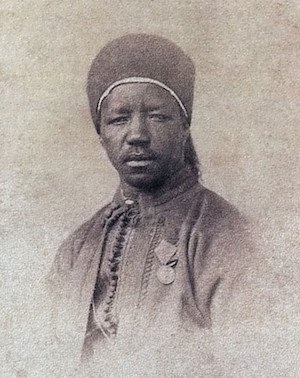
According to stories handed down to his descendants, a seven year old boy from Kurdufan in what is now central Sudan, orphaned because his father was killed in a revolt against an Egyptian occupation force and his mother subsequently committed suicide, was given by the Ottoman Viceroy of Egypt in Cairo, Muhammad Ali, as a gift to visiting Prussian Prince Friedrich Heinrich Albrecht, the youngest brother of Prussian King Friedrich Wilhelm IV. The prince named the child Sabac el Cher, which roughly translates to “good morning” in Arabic, and in 1843 returned with him to his palace in Berlin where the “little Nubian boy” was made a court servant. Described as an attentive student, he received German lessons from palace tutors, adjusted to the strict discipline of his superiors, and apparently did not experience significant mistreatment owing to his race. At age sixteen, he received Protestant baptism and out respect for this godfather, August Ferdinand Ströhmer, and Prince Albrecht, was christened August Albrecht Sabac el Cher.
Asked by Czar Alexander II to join in military operations to suppress insurgency in Russia’s Northern Caucasus in 1862, Prince Albrecht was accompanied by August, his valet and constant companion. In appreciation for his service in the region, Sabac el Cher was given a gold pocket watch by Czarina Maria Alexandrovna. Temporarily discarding Egyptian garb, August also fought in uniform in the Prussian infantry alongside Prince Albrecht in the Austro-Prussian War of 1866. For his actions at the decisive Battle of Königgrätz, Sabac el Cher was awarded a combat medal for valor. The following year, he married twenty-four year old Anna Maria Jung, the daughter of a wealthy Berlin textile merchant. Just a few months after the wedding, Anna bore a son, Gustav Albrecht, who became a noted military band and radio orchestra conductor; and in 1869 daughter Elisabeth Bertha Charlotte was born.
The Sabac el Cher family resided in an apartment in Prince Albrecht’s palace in Berlin, but domestic life was disrupted by the Franco-Prussian War of 1870. For his participation in several military engagements, including the siege of Metz and the Battle or Orléans, August was decorated with the coveted Iron Cross, Prussia’s highest military honor.
A stroke killed Prince Albrecht in 1872. August remained in the palace, employed as Silberverwalter (butler in charge of silverware) until his retirement in 1876 due to poor health. In 1882 he received his naturalization certificate from the Berlin police, affirming he had full rights of citizenship, something which the few Africans who had preceded him as inhabitants of Germany ever attained. August died of gastric cancer on September 21, 1885, and was buried in the cemetery of the historic Holy Trinity Church in Berlin.

